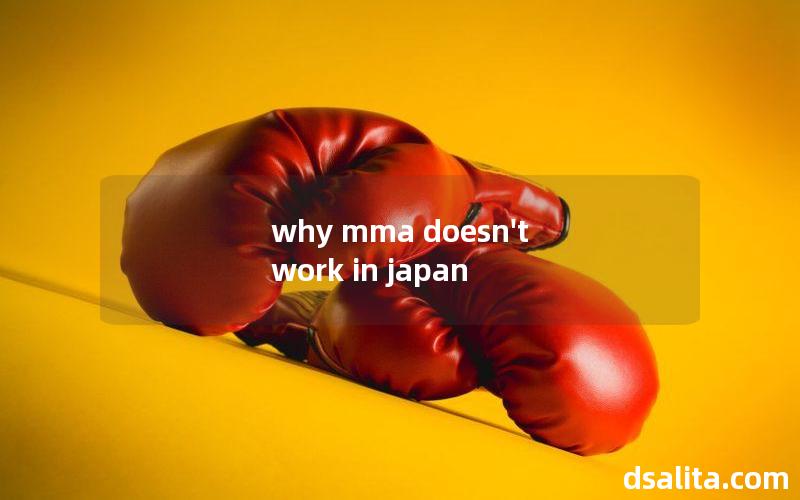Mixed Martial Arts (MMA) is a popular combat sport that has gained immense popularity worldwide. However, in Japan, MMA has struggled to gain the same level of success and acceptance as it has in other countries. There are several reasons why MMA doesn’t work in Japan, ranging from cultural factors to legal restrictions and competition from traditional martial arts.
Cultural Factors
One of the main reasons why MMA doesn’t work in Japan is due to cultural factors. Japan has a long history of traditional martial arts, such as judo, karate, and sumo, which are deeply rooted in the country’s culture. MMA, with its more aggressive and brutal nature, clashes with the traditional values of discipline and respect that are associated with these martial arts.
Additionally, Japanese society places a strong emphasis on hierarchy and respect for authority. MMA’s promotion of individualism and self-expression may be seen as disrespectful or rebellious, which goes against the traditional values of Japanese society.
Legal Restrictions
Another significant barrier to the success of MMA in Japan is the country’s strict regulations and legal restrictions. The Japanese government has imposed stringent rules regarding the safety and conduct of combat sports, which has led to limitations on MMA events and the participation of Japanese fighters.
For example, the use of elbows and knees to strike opponents is prohibited in Japan, which significantly alters the dynamics of MMA fights. Additionally, the requirement for fighters to wear gloves that are significantly thicker than those used in other countries further restricts the effectiveness of certain techniques commonly used in MMA.
Competition from Traditional Martial Arts
Japan has a rich tradition of martial arts, and many people in the country still prefer to practice and watch traditional martial arts rather than MMA. The popularity of sports like judo, karate, and sumo makes it challenging for MMA to gain a foothold in the country.
Traditional martial arts have a long-established infrastructure and support system in Japan, including dedicated training facilities, professional organizations, and a network of competitions. These factors make it difficult for MMA to compete for attention and resources.
Perception of Violence

MMA is often criticized for its violent nature, and this perception is particularly prevalent in Japan. The country has a strong aversion to violence and a preference for more controlled and disciplined forms of combat. The brutality and bloodshed associated with MMA fights can be off-putting to many Japanese spectators.
Furthermore, the media in Japan tends to focus on the negative aspects of MMA, highlighting injuries and controversies rather than the skill and technique involved. This negative portrayal further contributes to the perception that MMA is a violent and dangerous sport.
Lack of Prominent Japanese Fighters
Japan has produced some successful MMA fighters, such as Kazushi Sakuraba and Takanori Gomi, but they have not achieved the same level of fame and recognition as fighters from other countries. The absence of prominent Japanese fighters who can serve as role models and attract a large fan base has hindered the growth of MMA in Japan.
In contrast, countries like the United States and Brazil have produced numerous MMA stars who have become household names and have helped popularize the sport. Without local heroes to rally behind, Japanese fans may be less inclined to support and follow MMA.
Commercial Viability
MMA events require significant financial investment, including venue rental, fighter salaries, and production costs. In Japan, where the popularity and profitability of traditional martial arts are well-established, it can be challenging for MMA promoters to find financial support and sponsorship.
Additionally, the pay-per-view model, which is a significant revenue source for MMA promotions in other countries, has not been as successful in Japan. The reluctance of Japanese fans to pay for individual fights or events further limits the commercial viability of MMA in the country.
Conclusion
In conclusion, there are several reasons why MMA doesn’t work in Japan. Cultural factors, legal restrictions, competition from traditional martial arts, the perception of violence, the lack of prominent Japanese fighters, and commercial viability all contribute to the challenges faced by MMA in Japan. While the sport may continue to have a niche following in the country, it is unlikely to achieve the same level of success as it has in other parts of the world.

 Dsalita Boxing
Dsalita Boxing






